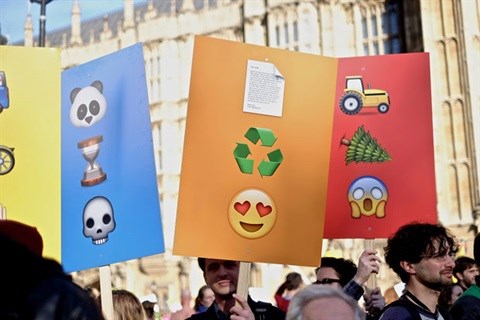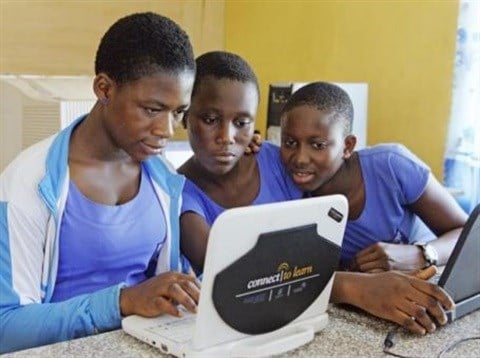
Top stories



ESG & SustainabilityRedisa calls on govt to fix South Africa’s “broken” waste management system
2 hours

AgricultureGlobal geopolitical escalation raises risks for South African agriculture
Gilberto Biacuana 1 hour


This week design agency Pentagram grabbed headlines because it made posters protesting climate change issues out of emojis, thereby "simplifying the green message". AdWeek reports that the agency wanted to make an impact (they did) and the posters served as an "antidote to scrawled angst".
They grabbed headlines for the catchy emoticons beloved of social media interaction these days and the attention of a new generation that is already dealing with the impact of climate change and other social problems - and will have to solve problems largely not of their own making in the future.
So brands that actively take a lead in corporate social responsibility, inculcating the value of CSI and addressing sustainability issues within their value system, will find traction among the millennials and the even more interesting Generation Z, currently still teenagers, and predicted to be a very socially aware generation when it comes to individual responsibility to the planet, when compared to previous generations.

Global e-waste will reach 65.4 million tonnes by 2017, a third higher than it was in 2012, says Ericsson in its 22nd Sustainability and Corporate Responsibility report, which includes findings from the 2014 Networked Society City Index and ConsumerLab research, which also demonstrates what Ericsson is doing in regards to this problem.
What a company like Ericsson has done is ensure that it continually researches its consumer base and their current and future needs in the tech space, culture, urban living. It keeps track of its own waste, implements programmes to offset that waste, as well as other sustainable programs in areas of financial inclusion, education and humanitarian response - and then publishes the findings globally in research reports that add to the knowledge base on these issues, creating an important body of work to track trends.
Ericsson is in fact the first ICT company to report according to the new United Nations Guiding Principles on Business and Human Rights Reporting Framework. It is generating energy efficiencies of 50% in its new Ericsson Radio System platform and 500,000 people in 12 countries in sub-Saharan Africa are benefitting from connectivity in the Millennium Villages Project, thereby benefitting programmes such as Connect to Learn which provides ICT to schools in remote, resource-poor communities, benefitting 50,000 students in 21 countries in sub-Saharan Africa.
As Hans Vestberg, president and CEO of Ericsson, said: "In the Networked Society, everyone and everything will be connected in real time. As a leading ICT company, our role is to drive this transformation, opening up new ways to innovate, to collaborate and to empower people, business and society. We want to ensure that connectivity paves the way for environmentally sustainable and equitable social and economic development."
Ericsson also partnered with the International Rescue Committee to connect and provide support for those impacted and working in areas hit by natural disasters, health crises, and conflict-driven humanitarian crises. The brand assisted the Ebola response in Liberia and Sierra Leone in 2014.
The trend to 'branding for good' and corporate social responsibility has been with us for almost a decade. Big brands have mostly stopped paying lip service to sustainability, but also need to be active in reporting their achievements, designing campaigns around their values and 'goodvertising' efforts, as I highlighted in this last trends column.
The Ericsson Corporate Responsibility and Sustainability report is worth a read from the research and stats it contains, to how a company reports on its achievements in this field and demonstrates its core values.

On 'Building trust through responsibility' Ericsson comments that its culture and core values support its responsible business approach to deliver long-term business benefits: "Conducting business responsibly is the foundation of our commitment to sustainability and corporate responsibility. Integrity, transparency and responsibility characterise the way we conduct business. It is critical to maintaining trust and credibility with customers, partners, employees, shareholders and other stakeholders."
Declarations like this are important for companies to attract the new generation of consumers who care. We need our brands to step up to focus on human rights issues; to aid in humanitarian crises and local disasters; step in to aid education when governments can't or won't; support international causes and local charities; demonstrate good governance and a service culture; live their business ethics, visibly - from the CEO down.
That is what makes great brands these days and it is more important than advertising, than mega-profits, than having celebrity endorsements. Because if brands don't have the endorsement of their new, younger, more socially aware consumers and don't endorse legitimate programmes to save our planet and all who inhabit it, no one has a future. It is that simple.

TRENDAFRiCA is a trend watching portal on consumer insight, research and trends from South Africa and further afield on the continent of Africa. It includes DAiLY trends headlines from around the world, influential Trendspotter columnists and in-depth reports on industry segments. Louise Marsland is the founder and editor.
Go to: www.trendafrica.co.za